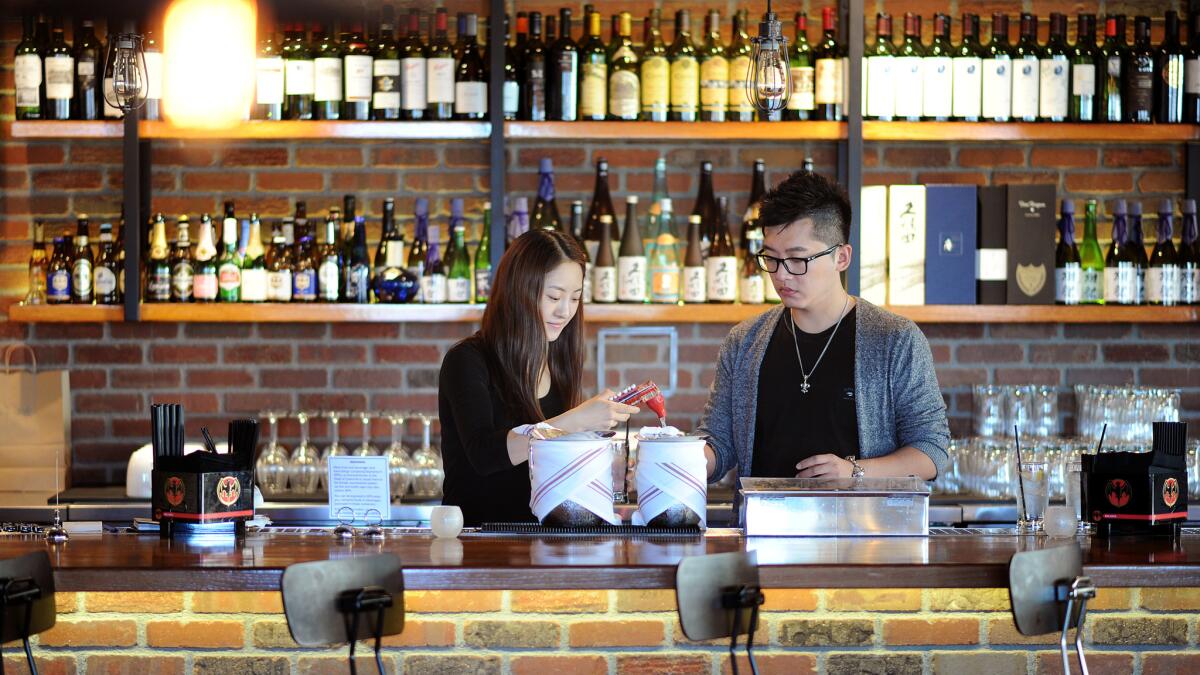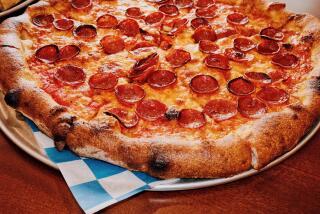Southland’s new wave of Chinese restaurants are about a lot more than takeout

Waldo Yan’s parents worked at a Chinese restaurant for years so that he could have a better life, toiling nights, weekends and holidays at a tiny restaurant in the food court of a Rosemead grocery store. Before his mother died two years ago, she begged him from a hospital bed “not to do this work.” But about a year ago, after graduating from UCLA with honors, Yan took over the family restaurant and began to pursue a career as a chef. He makes the food his mother used to make for him, to honor her memory and to prove that he’s made something of himself.
On Hop Louie’s last night of service, the bar was full and the dining room half-empty — like most nights at the Chinatown fixture.
The restaurant, co-owner Walter Soohoo said, was no longer profitable, though the bar would remain open.
Started in 1941, Hop Louie launched family businesses, kept friends and relatives employed and gave Soohoo’s daughters a better life. If that was the restaurant’s legacy, Soohoo said, he was satisfied. It was why he came to the United States in the first place.
A week earlier, one of Los Angeles’ newest Chinese restaurants opened with fanfare.
At Dongpo Kitchen in Universal Citywalk, the media was treated to a buffet of sliced duck, fried dumplings and snow-white steamed buns nestled in gleaming silver steam trays.
Wang Gang and his wife, Liang Di, started the Meizhou Dongpo Restaurant Group in 1996 with borrowed money from friends, opening their first establishment in Beijing. The parent company, according to a 2014 study, has 131 outlets, more than 8,000 employees and an annual revenue of $269 million.
For generations, Chinese immigrants have found that starting a restaurant was their best path to financial stability and achieving the American dream.
But in recent years, China’s economic resurgence has sent a wave of better-educated, more affluent immigrants to the U.S., bringing with them their own ambitions.
Their restaurants reflect a China newly confident in its own culture: large, lavish, with a focus on authenticity. These rising, middle-class entrepreneurs value the cachet of a five-star review over the crowds it could bring, and franchise potential over more takeout business.
Back then, our goal was to Americanize.
— Sharon Lee, whose great-grandfather started Ma Jen Low in 1878
::
No one knows how many Chinese restaurants there are in Southern California, though the Chinese Consumer Yellow Pages lists 1,250 establishments.
The first, opened more than a century ago, were essential economic toeholds in a country that passed laws against Chinese immigration and mocked their culture in newspaper and magazine stories.
Restaurants — and low-cost businesses like laundries — allowed families to get around the Chinese Exclusion Act and bring relatives to America on merchant visas to work as waiters, cooks and dishwashers. They gave immigrants the chance to work for themselves, especially when discrimination restricted job opportunities, said Sharon Lee, whose great-grandfather started Ma Jen Low — widely considered Los Angeles’ first Chinese restaurant when it opened downtown in 1878.
With the restaurant as their base, Lee’s family built on its success, launching five more restaurants, a Chinatown arcade and a gift shop in Disneyland. After her father died a few years ago, Lee rented the restaurant, by then known as General Lee’s, to tenants who converted it to a bar.
“The restaurant was a hub of a place that so many opportunities for our family branched out from,” Lee said.
As waves of immigration have shifted the cultural center of the community east of Chinatown to the suburban boulevards and strip malls of the San Gabriel Valley, many of Los Angeles’ early Chinese restaurants have shuttered. But the food they created — like chop suey, Chinese chicken salad and fortune cookies — are standard fare nationwide.
While newcomers like Meizhou Dongpo emphasize traditional flavors, Lee said, authenticity wasn’t important when her grandfather started out here.
“Back then, our goal was to Americanize,” she said.
::
The weekday lunch service at Chang’an in San Gabriel was going smoothly until a plate of lamb skewers emerged from the kitchen and caught owner Minda Zhang’s eye.
She frowned, grabbed the dish and whispered in the waiter’s ear. When the plate reemerged, it held an extra cup of sauce and more skewers.
At Chang’an, which opened last year, presentation is just as important as taste.

On the third floor of a strip mall — past a dozen quick-service noodle and dumpling restaurants, up a dusty staircase and behind tinted glass doors — Zhang and her husband, Nick, want to reintroduce America to Chinese food.
Glistening mounds of red-cooked pork get topped with micro greens and steamed stalks of bok choy, spread in a fan. Framed black-and-white portraits of Chinese film stars project a retro vibe. Sunlight streams in from a brick-accented, ivy-draped patio.
“We just want to show that Chinese culture can be cool too,” said Minda Zhang, 28.
Early reviews painted the restaurant as a hangout for China’s rich, sports car-racing youth. But Zhang said she wants to serve a wide audience she defined loosely as America’s middle class. The lunch specials are affordable at $15, she said, and the $1,289 bottle of wine is available just in case a high roller comes in.

Waldo Yan’s parents worked at a Chinese restaurant for years so that he could have a better life, toiling nights, weekends and holidays at a tiny restaurant in the food court of a Rosemead grocery store. Before his mother died two years ago, she begged him from a hospital bed “not to do this work.” But about a year ago, after graduating from UCLA with honors, Yan took over the family restaurant and began to pursue a career as a chef. He makes the food his mother used to make for him, to honor her memory and to prove that he’s made something of himself.
Chang’an — named for the ancestral capital of China during an era when the country had the most advanced culture in the world — is the Zhangs’ first restaurant.
The couple, born to well-off families, considered launching a design firm or real estate agency after they graduated from college in Los Angeles. In the end, like countless Chinese immigrants before them, they opened a restaurant.
“It’s not stable, everything’s changing,” Zhang said of life in China. “The economy is growing quickly, but that could change too.”
In China, Zhang had worked at a private bank that, among other things, helped billionaires lease private jets and yachts. But something bothered her about the country’s business culture: how respect seemed to be determined by wealth; how her older male bosses expected her to go drinking with clients after work; how all the relationships she made seemed to end after the transaction was completed.
Even though things might have been easier in China, “We hate that culture,” Zhang said. “We want to grow the American part of the family.”
The owners of another restaurant — a Chengdu seafood place in Monterey Park called Hip Hot, came to the U.S. as students.
TianTian Qiu and her boyfriend, Kai Lin, had one year to find jobs after their student visas expired upon graduating from USC. But any eventual employer would have to shoulder the costs of sponsoring their work visas. They sought an EB-5 visa, which applicants can earn in exchange for $500,000 to $1 million investments in U.S. businesses, but the wait was more than two years.
She was not a trained chef, Qiu said, but had hosted dinners for friends during college and had always dreamed of opening a restaurant. And however complicated that would be, she said, she knew it couldn’t compare to the chaos of trying to compete in the Chinese economy — where any new restaurant would be deluged with competitors and copycats.
Her native region of Chengdu provided inspiration, and Qiu wanted to share its cuisine with Americans. But when Hip Hot opened last year, non-Chinese customers, and even older Cantonese diners, found it too spicy.
So the couple kept tweaking their menu, adding dishes and changing recipes, trying to carve out a living in America while maintaining a Chinese identity in their food.
For now the business depends heavily on Chinese students hungry for a taste of home. But eventually, Qiu and Lin said, they want to open restaurants outside of Chinese enclaves like Monterey Park. To make that happen, they may do what the nation’s first Chinese immigrant restaurateurs did: compromise their food.
“We’re making things a little less spicy and trying to add dishes that Americans like,” Qiu said. “Like Peking duck.”
Twitter: @frankshyong
ALSO
Coroner accidentally cremated wrong man as his family planned a funeral and viewing
Two Los Angeles-area men charged with conspiring to smuggle fighter jet parts to Iran
More to Read
Sign up for Essential California
The most important California stories and recommendations in your inbox every morning.
You may occasionally receive promotional content from the Los Angeles Times.











